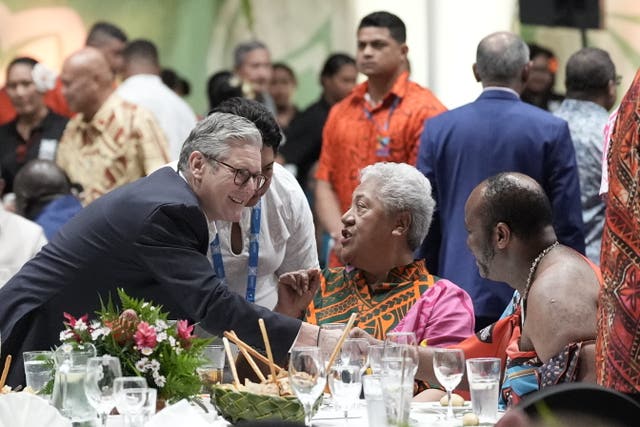Sir Keir Starmer has been told he must come to the table to discuss the “bad effects” of slavery as nations are said to be considering an agreement that could spark talks on the issue.
A final communiqué is expected to be agreed by leaders at the Chogm summit in Samoa on Saturday, it is understood.
Sources accept that there could be a reference to reparative justice in the final document, but officials stressed that this does not necessarily mean a change in the UK’s policy position.

Downing Street had earlier said reparations were not on the meeting’s agenda, but questions about whether the topic could be included in the final communiqué arose after the prime minister landed overnight.
Sir Keir said his focus for the meeting was to look at “the challenges facing the future” with other leaders.
Speaking to reporters as he traveled to the summit, he said there was “no doubt” that slavery was “abhorrent”, adding: “But I think from my point of view and taking the approach that I have just taken, I would -sooner to roll up my sleeves and work with them on the present challenges looking to the future than to spend a lot of time in the past. That’s my focus.”
On Thursday morning, the BBC reported that the final communiqué may mention further discussions on reparations related to the slave trade.

Frederick Mitchell, the Bahamian foreign affairs minister, said “there needs to be a discussion about the history” surrounding reparations.
Speaking to BBC Radio 4’s Today programme, he said Caricom countries – a community of 15 member states and six associate members in the Americas and the Caribbean – “want the conversation to start on this”.
He said: “There seems to even be a reluctance to start the conversation.
“Many of the institutions in the UK have already recognized the point of the apology, the British government is not quite there.
“But at this point there needs to be a discussion about the history of this and the ill effects of what happened after the abolition of slavery that continue to affect our societies today.”
Mr Mitchell told the BBC on Thursday morning that at the time there were “two paragraphs” in the communique which were the subject of controversy.
“The only line they’re arguing about is restorative justice or a restorative justice statement,” he said.
“It seems innocuous enough to us because really what needs to happen is an apology and a commitment to reparations.”
In Westminster, a shadow minister pushed the government to reaffirm its position, saying it was wrong to ask for money for “very serious sins committed hundreds of years ago”.
Shadow Commons leader Chris Phillip asked his Labor opponent Lucy Powell to confirm whether the government’s view is that “it’s completely wrong to be having discussions about reparations for things that happened hundreds and hundreds of years ago?”
Commons leader Ms Powell said ministers’ position on reparations had not changed and said: “We recognize the appalling impacts and the understandable and continuing strength of feeling across the Commonwealth and other communities on these issues.”